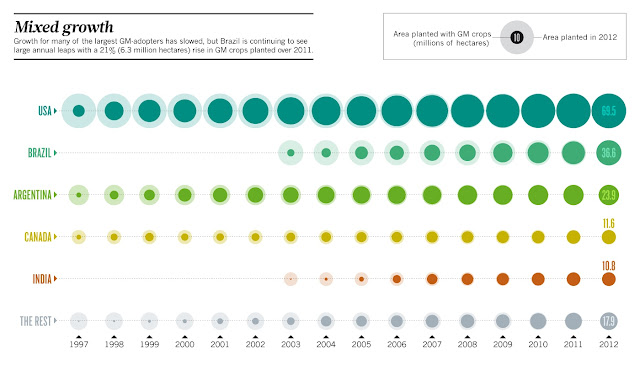The issue of genetically modified crops (or technically genetically modified organisms - GMOs) was front and center last week when the Supreme Court ruled on a case involving an Indiana farmer and Monsanto, the maker and patent-holder of Roundup Ready genetically-modified soybean seeds (Bowman v. Monsanto). Though the court ruled narrowly on the issue and didn't speak much to the broader issue of patent protection for products that might be self-replicating, it was a reminder of how complicated and often contentious the issue of GMOs has become in the United States.
The ruling also coincidentally came just weeks before trade talks between the U.S. and the European Union are set to begin with. And you guessed it, GMOs and differing views on agricultural practices will be a part of the discussion.
But of course the issue of GMOs isn't just in trade talks. Grocery stories like Whole Foods are taking steps to rid their shelves of all GMO products. Earlier this year, they announced mandatory labeling of all GMO foods by 2018. Vermont is going so far as to mandate labeling of products with GMO ingredients.
According to polling conducted earlier this year, the majority of the country agrees. An overwhelming 82 percent of Americans across different demographics think GMO foods should be labeled.
So, should we be concerned about GMOs? A recent series of articles published in the prestigious journal Nature shed some light on the prevalence of GMO crops in the U.S. agricultural market.
Here are a few highlights:
The ruling also coincidentally came just weeks before trade talks between the U.S. and the European Union are set to begin with. And you guessed it, GMOs and differing views on agricultural practices will be a part of the discussion.
But of course the issue of GMOs isn't just in trade talks. Grocery stories like Whole Foods are taking steps to rid their shelves of all GMO products. Earlier this year, they announced mandatory labeling of all GMO foods by 2018. Vermont is going so far as to mandate labeling of products with GMO ingredients.
According to polling conducted earlier this year, the majority of the country agrees. An overwhelming 82 percent of Americans across different demographics think GMO foods should be labeled.
So, should we be concerned about GMOs? A recent series of articles published in the prestigious journal Nature shed some light on the prevalence of GMO crops in the U.S. agricultural market.
Here are a few highlights:




No comments:
Post a Comment